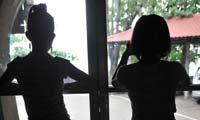“This is disgraceful”

Filipinos in Canada have joined a global chorus of condemnation against one of the homeland’s biggest TV stars who sparked outrage when a six-year-old boy simulated a striptease for cash on his show.
“This is disgraceful,” said Kim Roselie, a Flipino nurse in Vancouver echoing the disgust of government agencies, Catholic church organisations and other celebrities in the Philippines which have assailed Willie Revillame, saying he had forced the child to perform an embarrassing dance even when he was already in tears.
“Everyone is talking about this and it makes us feel angry and sad to see such explotation,” she said.
An ABS-CBN web poll asking; Are you in favor of Willie Revillame ending his TV contract resulted in over 75 percent of Pinoys worldwide saying the TV star had to go.
The embattled top-paid Filipino TV presenter said he would take leave from his top-rated variety show, “Willing Willie” following an advertising boycott and government investigations into the incident.
Videos of the show, include images of the skinny lad dancing nervously to a tune from rapper Snoop Dogg.
As Jan-Jan cries in distress while grimly bumping and grinding, the studio audience, including his family, is in fits of laughter, egged on by the host.
Merciless, Revillame pushes the six-year-old to keep dancing for money, mocking his performance as comparable to Burlesk Queen, the 1970s Philippines cult movie starring actress Vilma Santos (now a politician) as a bikini-clad cabaret performer whose sexy dance routine so traumatises her she has a miscarriage on stage.
“That’s how hard life is. Jan-Jan has to learn macho dancing at his age, for the sake of his family,” Revillame says with a laugh.
Revillame, who has hit the headlines for the wrong reasons before, hosts one of several popular TV shows that offer guests a chance to win cash, cars and other big prizes for performing in front of a live audience.
The TV star has denied wrongdoing and lashed out at his critics, hinting that he is the victim of a political witch-hunt.
ABC-TV5, the station that airs the variety show, stood by its host, saying that Revillame had not humiliated or coerced the boy as his critics claim.
Revillame and ABC-TV5 said that the outrage was sparked by heavily-edited scenes of the dance that were posted online to show Revillame in a bad light.
They also said other TV shows on rival channels had aired similar dance sequences involving children without complaint.
Revillame has suggested he is being singled out because he campaigned for a rival candidate who lost the 2010 election to President Benigno Aquino.
But ad pullouts and the displeasure of the Catholic Bishops’ Conference of the Philippines (CBCP) continued to bear down on the TV game show “Willing Willie” over the 6-year-old boy’s performance.
Procter & Gamble Philippines, Unilever Philippines and Jollibee Foods Corp. were the first to announce the pullout of ads.
Statements condemning the controversial episode of “Willing Willie” had earlier been issued by the Department of Social Welfare and Development, the Commission on Human Rights (CHR) and the Movie and Television Review and Classification Board (MTRCB), which is looking into the case.
The forces that put Jan-Jan in the spotlight have elements peculiar to The Philippines, but Manila is not an isolated case, reported The Australian.
Across Southeast Asia, in TV game shows, reality programs and talent contests, product launches, advertisements and mainstream films, children and minors under the malleable Asian age of consent are increasingly depicted in a highly sexualised and erotic fashion.
Thai commercial TV broadcasts popular “mini-Thai idol”-style contests showcasing heavily made-up children as young as three in sexy get-up, dancing and singing provocatively.
Similar fare is increasingly dished up to audiences in Indonesia and in poorer Cambodia. Often it’s cutesy but more often blatantly pedophile-friendly. In Thailand, where made-up toddler girls sport pink T-shirts saying “I’m Single”, the press occasionally reports on controversies surrounding beauty contests for children from the age of three.
The treatment of Southeast Asian children as commodities extends from the mainstream media to bars and brothels.
A new study backed by the French Research Institute on Contemporary Southeast Asia, “The Trade in Human Beings for Sex in Southeast Asia”, edited by Pierre Le Roux, says sex trafficking of women and children, “already widespread internationally, continues to escalate”. “Thailand is an emerging epicentre of both sex trafficking and sex tourism”, the study says, noting that the first sex tourists are local and regional, followed by the smaller but persistent group of foreigners from outside Asia.
Some figures suggest as many as 250,000 women and children are trafficked annually in Southeast Asia.
Gender expert Carina Chotirawe, a professor at Bangkok’s Chulalongkorn University, believes more work needs to be done in the region “to shift the consciousness of the parents and society as a whole on the protection of children”.
“The Revillame show was despicable. It felt like he was prostituting poverty, making the poor pander to him for quick cash fixes, as he does on a daily basis, and never mind if it entails a kid being sexed up and crying as he (Jan-Jan) does so pitifully,” she said.









